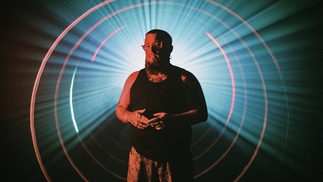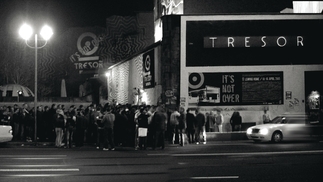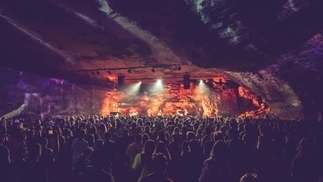MR G: WEATHERING THE STORM
From career triumphs to personal tragedies, his time has truly come
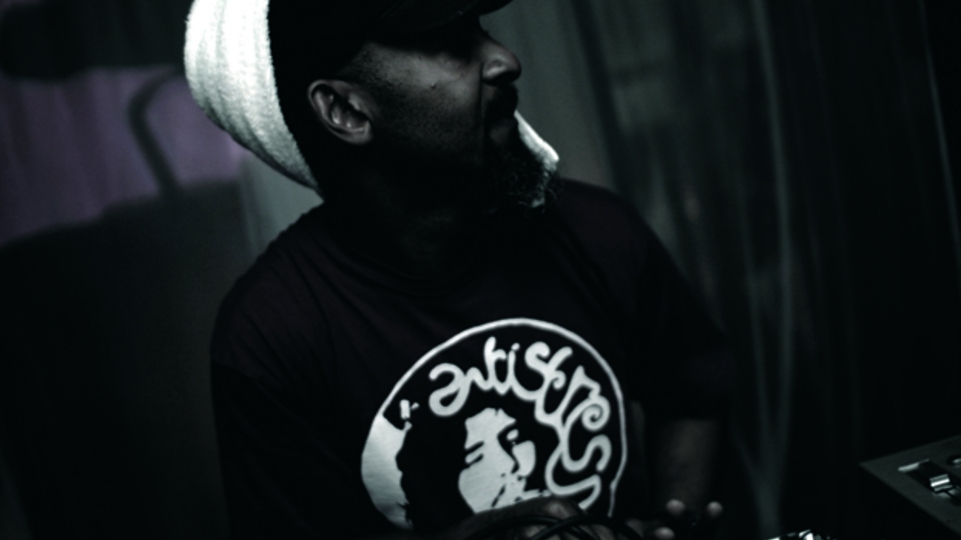
Mr G has led a tempestuous life with as many career triumphs as personal tragedies. From his roots in early UK housers KCC to techno years with The Advent, he's been an intrinsic link in dance music's evolution. And after all the tribulations, with a career retrospective for Rekids and more popularity than ever, it could be his time has truly come...
If what you've been through determines who you are, then Mr G's current demand as a producer, remixer and disco devastator could scarcely be more deserved. Let's say there have been some ups and downs along the way, but Colin McBean has weathered everything that's been thrown at him. And right now, he knows how lucky he is.
“I played Berghain last week, “ he says. “I went on after a guy playing 130bpm linear techno, little old Mr G who starts his set with [the sample] 'If house is a nation'... in the techno room. I was shitting myself, but after the third track I had the main room swinging rather than fists in the air. And on that rig? Oh my days. That's a good feeling. But you've hit a bit of a wall there. It doesn't get much better than playing on Berghain's system. I'm dancing, I've got a drink of rum in my hand, I'm being paid to come out of my tiny studio to throw down to x amount of people... I'm blessed. That's a good life.”
He's 52 this year, so he's been around the block. And heard a lot of soundsystems. He stopped DJing a couple of years back and decided to fire up his old Akai MPC sequencer and only play live. “You turn up with your own sound, and that means something,” he says. He knows a bit about lugging kit around. As half of the revered outfit The Advent, he toured the globe with his then partner in techno Cisco Ferreira, their productions lauded by their heroes, the likes of Jeff Mills and Joey Beltram.
But his story goes back much further than this. And it involves more lugging too. McBean had schooled himself in music in his hometown of Derby, graduating from being a 'box boy' for a few of the reggae soundsystems around the Midlands and then to becoming a selector, choosing the tracks in soundsystem battles. His neighbour introduced him to the Philadelphia International and Salsoul sounds, and that remains his most treasured music.
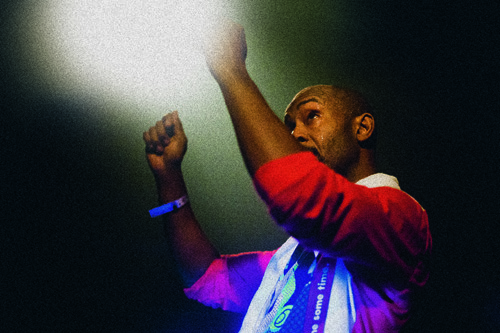
“The '70s for me, that was the golden era,” he says. “The sound, the production, the warmth. The innocence of all that weirdness.” He got a job at the local record shop and from there, it was all about collecting. Obsessively collecting. First it was dub, then indie, blues, jazz, classical and eventually, house music. He still travels from his home, now in quaint Market Harborough, to Soho every Thursday to spend the day buying music. He has a vinyl collection nudging the 30,000 mark.
He started to train as a chef, but London was calling him. He made the move from Derby, and met Keith Franklin on London's nevermore vibrant club scene of the mid-'80s. Franklin, with fellow DJ Kid Batchelor, was behind Bang the Party, among the first exponents of house music in the UK. He fell in with the right crowd, and with Ferreira, they established the KCC soundsystem, a mainstay of the Notting Hill Carnival and an early adopter of house and garage music in London. As a production outfit, they'd end up releasing tracks too, on labels like London's seminal Flying and New York's Shelter Records.
But carnival was where KCC thrived. “We played in the centre in Powis Square, but the police had to move us. We had what are called long throw speakers, which sounded louder the further away you were. We'd set them on the corner, and down at the bottom junction, it would just be tearing. We were just too big.” Music-wise, anything went. “It just didn't matter, you could play early boogie, disco, house, electro, hip-hop, a little bit of reggae and dub, as long as you bring it to the crowd and present it in the right way. That's the art of the DJ. It's about taking that risk, that if it comes off, it takes the party on a left turn. That's still what I look for now in a DJ or a label, people who will take a risk. Left-of-centre? I'm there all day long.”
TECHNO FUNK
He was by this time totally immersed in the London scene. He and KCC were residents at Melange at a 'posh club' on Ganton Street in the West End, fitted with the Rocking Crew's system and featuring LTJ Bukem as fellow resident and guests like Derrick May, Richie Hawtin, Juan Atkins and Kevin Saunderson, all playing for about £80 a pop. Shoom was starting too, but that wasn't his thing. “I wasbuying the records, Eddie Richards, Baby Ford, Phuture were crushing it at that time,” he says. “But that scene itself, I wasn't so much into. I went to Shoom maybe once or twice.”
But it was from Ferreira, his KCC cohort, that he would get his first taste of techno. “Cisco came to me with the early Jeff Mills stuff, and I understood it. It was so funky. He took me to Lost, and being on stage and watching this guy with three decks, throwing records on the floor, hips swinging, I thought, 'Man, this guy is funky!' From there it was Joey Beltram, Luke Slater, Underground Resistance, and then when you got to Underground Resistance, you came back to the soul. In effect I hadn't strayed too far from where I was.” Together, they formed The Advent in the mid-'90s and signed to the influential imprint Internal, home to Orbital and CJ Bolland. They were a solid, staple live act extolling pounding techno imbued with deepest, darkest funk.
They toured for several years, hauling their kit all over Europe to start with, then out to the Far East. Albums 'Elements of Life' and 'New Beginnings' dropped, but things between the pair deteriorated. By 1999 they'd split. “Truth be told, we fell out,” he says. “I wasn't who I am now. Cisco was the engineer. He knew the knobs and buttons. I didn't. I was the one who could bring an amazing loop, or bring that amazing record to the studio, who could understand the vibe, what worked, what didn't. Eventually, I wasn't bringing enough to the table. I was the guy who was dancing on stage. And that didn't fit well with me. I couldn't carry on.”
This wasn't a good time for him. “I'd fallen off a train,” he says. “One minute we were supposed to be doing a show in Naples, the next it was over. There was a lot of soul searching. Can I do this? Do I have a story to tell? I didn't think I had. But I had this machine, the MPC. I played with it, and played with it, started reading magazines, bought a mixer, some outboard stuff, cables everywhere in the living room. Suddenly I had my own studio. From working with all these people in the studio, with Cisco, with Keith, I learned something but without realising,” he says. “There's a point where it starts to make sense to you, and then, you're off.”
SETBACKS
He'd been making some house with Cisco before the Advent split as G-Flame and Mr G (as a self-confessed “Spider-Man freak”, the G is from Green Goblin), so he returned to his already established recording name. Inspiring him was consistency, the consistency of those artists he revered, like Maurizio, Joey Beltram, Mills, Luke Slater, Carl Craig, Moodymann and Theo Parrish. “Maurizio...”, he trails off. “He was almost giving you bass like it came out of Jamaica, in some cases even slightly heavier. And he's still out there. The first five releases from anyone are always the most interesting, because you're hungry. But then to be consistent and remain interesting, that's the hard part.”
He's been wildly prolific since that moment that it all started to make sense, track after track dropping on his Phoenix G label, Defected, End Recordings, spearheading a new 'tech house' sound, starting that blurring of lines that still resonates today. Old friends like Hawtin and Slater would give him props, letting him know the productions were working in the clubs. Tracks like 'Lightz' found him mashing his beloved disco with driving house music. But the setbacks kept coming.
At 44, he suffered a heart-attack, just as things were gaining momentum. “My cholesterol was through the roof. I'm a trained chef, remember. And I'd lived a life! I should have seen the signs. The whole world stopped, my career stopped. And I had to start from scratch again.” He began working again, gradually building himself back up. Then one day he returned from playing in Japan to find that his best friend and mentor had developed a brain tumour. He packed his career in, and became his full-time carer for seven months until he died.
He credits his current proliferation in the studio to this experience. “I've got so much pain and energy and memories and hurt, and that's how I exorcise [it]. But the one person I want to see all this, isn't here.” Since 2008, he's been part of Radio Slave's Rekids crew. He's dropped two albums for them, 'Still Here' in 2010 and 'State of Flux' last year. Much of that rawness of pain and loss came out in the latter. Now there's another, 'Retrospective', a collection of his best dancefloor moments. It's a dizzying mix of driving, jacking house, straight-up party starters and deep, fluid techno, from the blissfully funky 'My Father's Farda' to the devastating 'Danger'.
Now he finds himself at his most in-demand ever, and perhaps not before time. “It's strange how life works,” he says. “I'm eternally grateful. The journey I've had... most people don't get to see it how I've seen it.” Karma, it seems, has repaid him.
